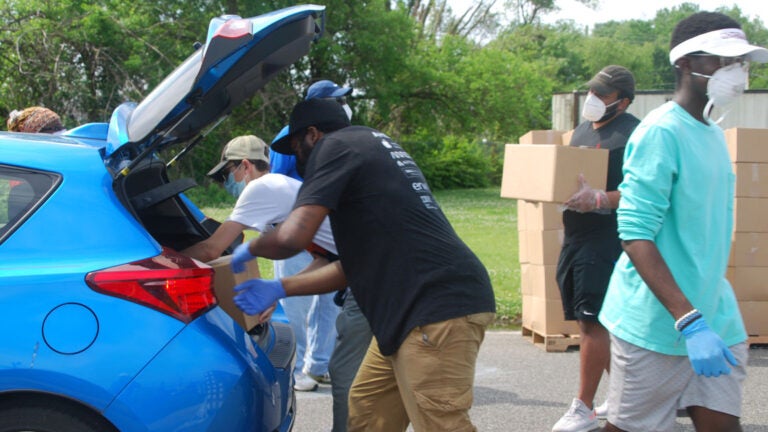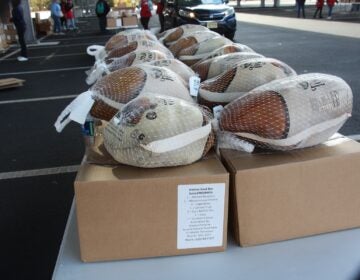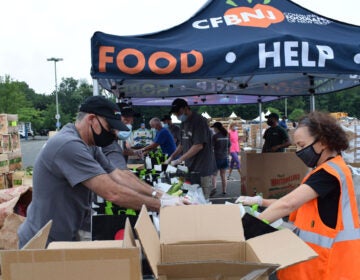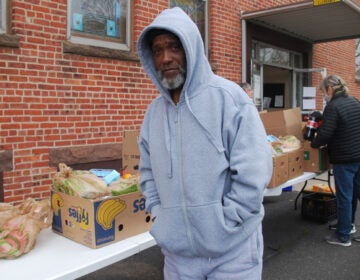Food banks expect demand to remain high for months as N.J. starts to reopen
With unemployment at 15%, thousands will struggle to put their own food on the table, food bank officials say

Volunteers load food boxes into cars during a food distribution by the Food Bank of South Jersey in Riverside, Burlington County on June 6. (Jon Hurdle/NJ Spotlight)
This story originally appeared on NJ Spotlight.
New Jersey food banks are expecting demand for food assistance will remain strong for months to come because of high levels of unemployment even as businesses begin to reopen from their nearly three-month COVID-19 shutdown.
The 1.2 million New Jerseyans who have filed for unemployment benefits since the pandemic shutdowns began in March won’t all restart their jobs or find new ones right away, and that’s going to keep pressure on the state’s three major food banks to make sure hundreds of food pantries are stocked with extra food for people who could otherwise go hungry.
Demand for food boxes has surged by around 50% since mass layoffs began in March, and is likely to remain high for a year or more as the state’s economy struggles to recover from the devastation of the coronavirus, food bank executives said.
“We don’t see it slowing down right now, and we’re preparing for what’s coming up in the next four, six, 18 months,” said Fred Wasiak, president of the Food Bank of South Jersey, which serves Burlington, Camden, Gloucester and Salem counties. “The cameras go away, the masks go away, but the ripple effect of unemployment is going to be a long time, and we’re anticipating twenty-plus percent more food-insecure in the next twelve to eighteen months.”
Speaking at a food distribution event in Riverside, Burlington County on Saturday, Wasiak said some people’s jobs are simply not coming back after their employers have been shut down for three months, while others may convert to part-time, and federal stimulus payments run out.
Surge in unemployment
New Jersey’s official unemployment rate surged to 15.3% in April, more than four times its rate in March, according to the U.S. Bureau of Labor Statistics.
At the Community FoodBank of New Jersey, which serves 16 counties, demand for food at partner agencies such as local food pantries has increased by about 50% overall since the pandemic struck but it’s even higher in areas of high unemployment like Atlantic City, said Nicole Williams, a spokeswoman.
At the same time, donations of food from supermarkets and elsewhere dropped by about 30% in May, forcing the food bank to buy more food and increasing its monthly expenses by about $1 million, she said. “Our supermarket partners are very good to us, but if they’re struggling to keep food on their own shelves, they certainly don’t have enough left to donate.”
The community food bank supplied enough food for about 7 million meals in both April and May, a record monthly high in the bank’s 45-year history, and demand is likely to remain strong, Williams said.
“We expect that need in the community will likely continue to grow, which may result in even higher expenses as we work to keep up with the demand,” Williams said.
Big demand in South Jersey
At Fulfill, a food bank serving Monmouth and Ocean counties, the pandemic has driven food demand up by about 40% from year-ago levels, said Kim Guadagno, the organization’s president and former lieutenant governor of New Jersey. With the Shore’s dependence on the tourism and hospitality businesses closed by the pandemic, the area is particularly hard-hit, she said.
“The longer we are closed, the more businesses will not be able to survive. And, as unemployment runs out — especially the federal bump — we expect more of an increase in demand,” Guadagno said.
In Passaic County, six nonprofits are cooperating to provide food and other essentials to homebound and at-risk populations.
Mark Dinglasan, executive director of CUMAC, one of the Passaic groups, said they had to change their food-distribution policies when the pandemic hit to minimize the risk of infection for staff and clients.
“Once COVID-19 happened, supply chains were broken and so sourcing food and then providing food in a way that was safe for our organization and our team members and our clients became a challenge,” he said.

Get daily updates from WHYY News!
New ‘grab and go’ process
The organizations switched to a “grab and go” service model where clients would come to the door, state the size of their household, and then be given enough food for 15 days, Dinglasan said.
At the event in Riverside, 245 cars carrying more than 900 people waited in line for masked volunteers to load boxes of produce, milk, chicken, and nonperishable food into their trunks. The food totaled 500 boxes of shelf-stable items; 500 boxes of produce; 900 whole chickens; 500 five-pound bags of chicken fingers, and 1,920 gallons of milk. Everyone in line was served, said Jennifer Crea Aydjian, chief of staff for state Sen. Troy Singleton, who was helping to load boxes into cars.
Singleton, a Democrat from Burlington County whose district includes Riverside, said the pandemic shutdowns have increased the number of people who were already classified as food-insecure — meaning that they don’t have continuous access to nutritional food.
“We know anecdotally that there are some families that will not have the food necessary to feed their families if not for the great work of the Food Bank of South Jersey,” he said. “We are not seeing the demand slow down.”
Fear of infection
Near the head of the line was Pearline Campbell, 55, of Willingboro, who lost her job as a chef because of the pandemic shutdown, and doesn’t expect to return to work any time soon because she fears being infected or passing the virus on to other members of her household.
“What I can’t buy, I get from food banks,” she said. “It helps me out in a lot of ways. I get fruits and vegetables for the kids.”
Donna Wassmuth, 61, of Riverside, said she has not had a full-time job since last September, and lost a part-time retail job because of the pandemic shutdown. Her benefit payments stopped seven weeks ago, and she has been relying on food bank assistance to build up her supplies. “I had stuff, but this supplemented what I needed,” she said. Wassmuth said she was due to start a new full-time job in retail on Monday.
Although food donations are down at the Community FoodBank of New Jersey, they have increased at the South Jersey bank by 42% compared with a year ago, and that has helped it build up its reserves to a record 3 million pounds, Wasiak said.
He said the Food Bank of South Jersey set successive monthly records for food distributed — rising from 1.5 million pounds in March to 1.7 million in April and 1.9 million in May. He’s expecting to distribute some 2 million pounds in June as joblessness continues to eat into people’s incomes.
“Even though things are opening up, it’s going to take a while for people to get their feet back on the ground,” said. “We’re going to have to fill the gap for months to come.”
WHYY is your source for fact-based, in-depth journalism and information. As a nonprofit organization, we rely on financial support from readers like you. Please give today.



![CoronavirusPandemic_1024x512[1]](https://whyy.org/wp-content/uploads/2020/03/CoronavirusPandemic_1024x5121-300x150.jpg)


